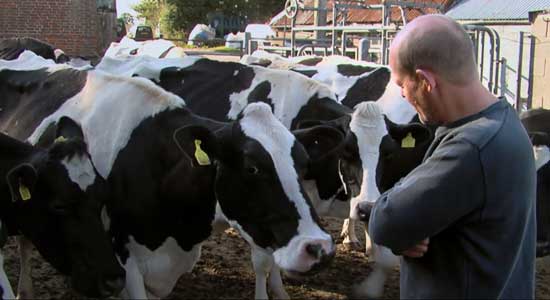The Moo Man follows an affable, compassionate farmer who is dedicated to his tiny herd on the increasingly obsolete family dairy farm.

Filmed over four years, The Moo Man follows an affable, compassionate farmer who is dedicated to his tiny herd on the increasingly obsolete family dairy farm. Directed by Andy Heathcote and Heike Bachelier, this gentle, easygoing documentary was a favorite with audiences and even Robert Redford himself at the 2013 Sundance Film Festival, where it was one of 12 films competing in the World Cinema Documentary Competition.
The filmmakers paint a bucolic portrait of a middle-aged farmer who sells the raw, unpasteurized milk he gets from his herd of 55-70 cows in East Sussex. As his photogenic black-and-white Holsteins graze along the marshes near Pevensey Bay, we’re treated to the region’s idyllic beauty. Fortunately, while cinematography is lovely, there are enough rusty pens and modern farm equipment to keep it from veering into schmaltzy overkill.
The film revolves around the Moo Man, whose real name is Stephen Hook. He’s an underdog with a likeable demeanor and it’s easy to root for him throughout the film.
As a result of modern dairy practices, Hook has decided to turn his back on the cost-cutting and trading strategies that lead to the “horrible shop milk” sold at supermarket chains. Instead, he sells his milk directly to the public, frequenting farmers markets, where he charms potential customers into trying a free sample. He’s confident that Hook & Son milk is far superior to supermarket milk and hopes a single taste will enlighten nonbelievers.
Despite his best efforts, however, the mass-production marketplace is winning. Grocery stores sell a cheaper, inferior product that is forcing the closure of one family farm after the next. In fact, the film concludes with text that informs us that one family farm shuts down permanently in the U.K each day. Hook, who relies on working tax credits to get by, faces this constant uncertainty and bristles at the unfairness of his situation.
“Why don’t [grocery stores] pay us a price that allows us to live with some dignity and to pay for our own way of living?” he says, adding that as the family farm dies, so does the knowledge and skills gained from generations of farmers who spent their lives working the land and tending their animals.
“Everything on a farm is a cycle,” he says wistfully. “You’ve got to appreciate the bad moments to enjoy the good.”
Despite this ongoing struggle, Hook and his family – including his dad, his wife and their four young children – strive to run their dairy farm as wholesomely as they can. They win over steady customers, and have to acquire an expensive new bottling machine to meet the demand.
The majority of the Moo Man’s day is spent tending to his herd. Hook knows the personality of each cow. He takes the time to build these bonds, and in return, they flock to his side when called, with very little herding required.
The filmmakers use small, dramatic moments to showcase the rhythms of daily life on a dairy farm. In one sequence, Hook attends to the birth of three calves in a row. In another, he realizes a calf has injured itself after swallowing some wire. This is the day-to-day business of keeping a small farm afloat. Despite its pastoral surface, it’s never easy. When the vet diagnoses tuberculosis in his herd, we are understandably worried about the future of Hook & Son.
Without a doubt, the star of this show is Ida, a 12-year-old cow and the Moo Man’s constant companion. She travels with him to the English coastline and acts as his “poster girl” during a photo shoot. Watching Hook’s fondness for Ida is the highlight of this documentary. When she falls ill, we feel Hook’s concern and sadness.
“Everything on a farm is a cycle,” he says wistfully. “You’ve got to appreciate the bad moments to enjoy the good.”
On balance, the Moo Man’s “lovely ladies” live several years longer than their factory farm cousins. Even his bull calves – often killed immediately after they are born to save farmers a bit of money – get to live and graze happily for a few years before the inevitable trip to the slaughterhouse. Compassionate or not, farmers must farm.
This is the film’s strength. It is realistic and moving, but never mawkish. The Moo Man is a genuinely poignant film, thanks largely to Hook’s unassuming, kindly personality. His world is showcased so effectively that it’s impossible not to feel for him as he weathers storm after storm.
The filmmakers use subtlety and wit to paint a picture of the family farm, which appears to be on the endangered species list in Britain. They do an excellent job at illustrating the growing challenges faced by independent farmers. This movie is slow, relaxed and engaging – just like its main character. And if nothing else, he’s likely to convince you to sample some raw milk the next time you get a chance at the farmers market.
Rating: Unrated and family-friendly
Where to Watch: Available for purchase on the The Moo Man website, iTunes and Vimeo on Demand.